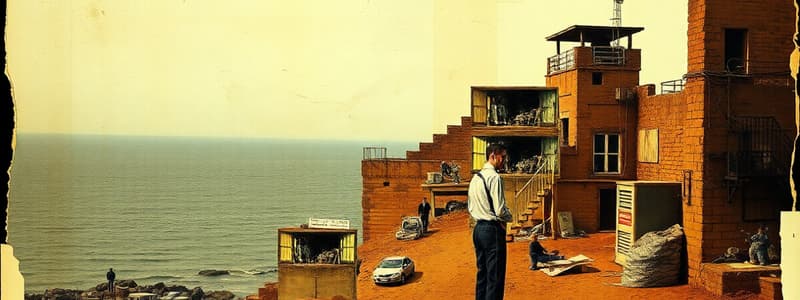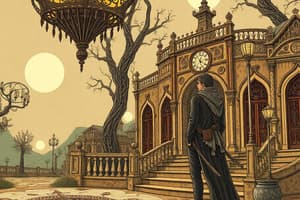Podcast
Questions and Answers
In 'Children of Men,' what is the primary societal impact of the prolonged infertility crisis, beyond just the lack of births?
In 'Children of Men,' what is the primary societal impact of the prolonged infertility crisis, beyond just the lack of births?
- A widespread cultural and artistic renaissance, as people seek new ways to find meaning in a childless world.
- A renewed focus on scientific advancement and technological solutions to overcome the biological challenge.
- The collapse of social order, coupled with pervasive despair, xenophobia, and oppressive governmental control. (correct)
- A global movement towards sustainable living and resource conservation, as societies prepare for eventual decline.
How does the film 'Children of Men' diverge from the typical post-apocalyptic narrative in its depiction of societal breakdown?
How does the film 'Children of Men' diverge from the typical post-apocalyptic narrative in its depiction of societal breakdown?
- It promotes technological solutions to reverse the causes of infertility and restore societal functions.
- It emphasizes the resilience of human communities in the face of environmental disasters.
- It explores the consequences of a biological crisis leading to a loss of hope for future generations rather than ecological disaster or nuclear war. (correct)
- It focuses on the psychological impact of resource scarcity rather than physical survival.
Considering Theo Faron's transformation throughout 'Children of Men', what internal conflict primarily drives his actions and decisions?
Considering Theo Faron's transformation throughout 'Children of Men', what internal conflict primarily drives his actions and decisions?
- His desire for personal redemption after failing to protect his own family.
- His determination to uncover the scientific cause of the global infertility crisis.
- His ambition to regain a position of influence within the remnants of the British government.
- His struggle to reconcile his past activism with his present-day cynicism and disillusionment. (correct)
How does the concept of 'government control' function within the narrative of Children of Men?
How does the concept of 'government control' function within the narrative of Children of Men?
Flashcards
Children of Men
Children of Men
2006 dystopian thriller directed by Alfonso Cuarón, set in a world facing extinction due to infertility.
Main Themes
Main Themes
The film explores societal breakdown, the importance of hope, and the human drive to survive in a world without a future generation.
Year 2027
Year 2027
The year in which the movie is set, in a dystopian UK, amid global infertility.
Cause of Infertility
Cause of Infertility
Signup and view all the flashcards
Theo Faron
Theo Faron
Signup and view all the flashcards
Kee
Kee
Signup and view all the flashcards
Loss of Hope
Loss of Hope
Signup and view all the flashcards
Xenophobia and Nationalism
Xenophobia and Nationalism
Signup and view all the flashcards
Redemption in 'Children of Men'
Redemption in 'Children of Men'
Signup and view all the flashcards
Long Takes
Long Takes
Signup and view all the flashcards
Handheld Camera
Handheld Camera
Signup and view all the flashcards
The Ambush Scene
The Ambush Scene
Signup and view all the flashcards
Kee's Baby
Kee's Baby
Signup and view all the flashcards
The Fishes Symbolism
The Fishes Symbolism
Signup and view all the flashcards
Immigration Theme
Immigration Theme
Signup and view all the flashcards
Environmental Commentary
Environmental Commentary
Signup and view all the flashcards
Study Notes
- Children of Men is a 2006 dystopian thriller directed by Alfonso Cuarón, depicting a near-future where humanity faces extinction because of widespread infertility.
Overview
- The film explores societal collapse, hope, and the will to survive in a world without future generations.
- It is based on P.D. James's 1992 novel "The Children of Men," but the film adaptation diverges significantly from the source material.
Setting and Plot
- The year is 2027
- The location is a dystopian United Kingdom, one of the few functioning societies remaining after global infertility.
- The cause of infertility is unknown; humanity has been infertile for 18 years.
- This infertility results in the collapse of order, widespread despair, and the rise of xenophobia and oppressive government control.
- The plot focuses on Theo Faron, a disillusioned former activist, who is tasked with protecting Kee, a mysteriously pregnant young refugee.
- Theo's objective is to transport Kee to the Human Project, a group of scientists in the Azores Islands, who may hold the key to curing the infertility crisis.
Main Characters
- Theo Faron, played by Clive Owen, is a cynical, world-weary former activist who is reluctantly drawn into the mission to protect Kee.
- Kee, played by Clare-Hope Ashitey, is a young refugee from an unspecified African country and the first pregnant woman in nearly two decades.
- Julian Taylor, played by Julianne Moore, is the leader of the "Fishes" refugee rights group, Theo's former wife, and initially spearheads the effort to protect Kee.
- Luke is a member of the Fishes who later betrays the group.
- Jasper Palmer, played by Michael Caine, is Theo's aging friend, a former political cartoonist who provides Theo with assistance and philosophical insight.
- Syd Marchant is a corrupt border guard who helps Theo and Kee.
Key Themes
- The prolonged infertility crisis has led to widespread despair and a sense of hopelessness about the future of humanity.
- The UK has become a police state, fueled by anti-immigrant sentiment and government efforts to control the refugee population.
- The film depicts a society on the brink of collapse, with failing infrastructure, rampant crime, and the erosion of civil liberties.
- Kee's pregnancy represents a last chance for humanity, highlighting the preciousness of life and the importance of protecting future generations.
- Theo's journey involves rediscovering his sense of purpose and fighting for a cause greater than himself, offering a glimmer of hope amid the darkness.
Cinematography and Style
- A distinctive feature is the film's long takes and immersive camerawork, creating realism and immediacy.
- Several scenes are filmed in uninterrupted single shots lasting several minutes, heightening tension and drawing the viewer into the action.
- The film employs a gritty, realistic visual style, avoiding excessive special effects to emphasize the bleakness of the setting.
- The use of handheld cameras adds to the documentary-style realism, making the viewer feel like they are witnessing events firsthand.
Notable Scenes
- The ambush on the road is a long, continuous shot depicting a chaotic attack on the refugees' convoy, showcasing the film's visceral action and immersive cinematography.
- The Battle of London is a protracted and intense sequence set in a refugee camp, with Theo and Kee caught in the crossfire between the army, police, and the rebels.
- Kee's childbirth is a quiet and intimate scene amidst the chaos, symbolizing hope and the continuation of life.
Symbolism
- Kee's baby represents the future of humanity and the possibility of renewal.
- The Fishes symbolize resistance against oppression and the fight for human rights.
- The dilapidated setting reflects the decay of society and the loss of hope.
- Jasper's stories provide philosophical commentary on the state of the world and the importance of finding meaning in life.
Reception
- Children of Men was widely praised for its direction, cinematography, performances, and thought-provoking themes.
- The film received numerous awards and nominations, including an Academy Award nomination for Best Adapted Screenplay.
- The film has influenced subsequent dystopian films and television series with its realistic and immersive portrayal of societal collapse.
Social Commentary
- The film raises questions about the treatment of refugees and the rise of anti-immigrant sentiment in times of crisis.
- It explores the dangers of authoritarianism and the erosion of civil liberties in the name of security.
- The backdrop of environmental degradation and resource scarcity hints at the underlying causes of societal breakdown.
- The film raises profound questions about the meaning of life, the importance of hope, and the responsibility to protect future generations.
Studying That Suits You
Use AI to generate personalized quizzes and flashcards to suit your learning preferences.




